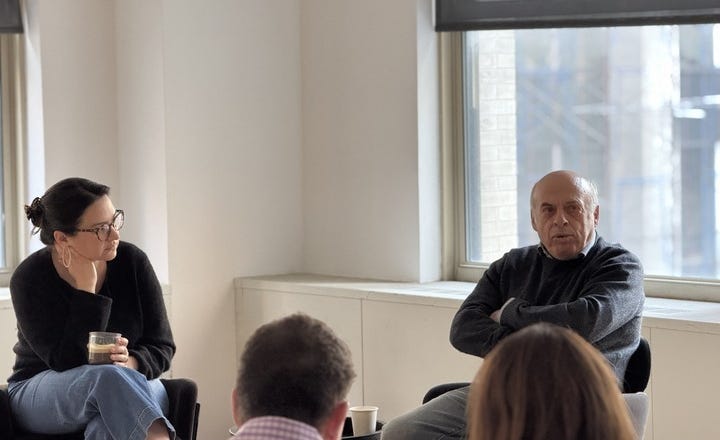
One of the signs that The Free Press has become a real newsroom is that important figures—intellectuals, politicians, comedians, and writers—swing by our office for conversations.
Of late: Rob Henderson, Simon Sebag Montefiore, Konstantin Kisin, and Paul Kingsnorth. And earlier this week: Natan Sharansky, one of the men who changed the course of the twentieth century.
I suspect readers of The Free Press need no introduction to Sharansky, who is no stranger to our pages. I’ve had the honor of interviewing Natan in Israel in the wake of October 7, and, most recently, we published his remarkable letters he exchanged with Alexei Navalny in the gulag.
But just in case you need a refresher:
Natan Sharansky was born in Donetsk, Ukraine—then called Stalino—in 1948, the same year as the birth of the modern State of Israel. A chess prodigy and a mathematician, he became a figure of international importance in 1977, when he was imprisoned by the Soviet Union—on manufactured charges of treason—for the real crime of wanting to emigrate to Israel.
At his court hearing in 1978, he famously said, “To the court, I have nothing to say. To my wife, and my people, I say, next year in Jerusalem.”
Getting to Jerusalem took him longer than a year.
Sharansky spent nine years in the gulag—often in solitary confinement. In 1983, he was in a tiny cell in a prison near the Siberian border when he learned that President Ronald Reagan had labeled the Soviet Union an “evil empire.”
That empire fell eight years later, in no small part because of Sharansky, who emigrated to Israel upon his release from prison in 1986 and reunited with his wife, Avital, an activist who stared down presidents and prime ministers in order to free her husband and all refuseniks.
Sharansky then had a long political career, serving as a cabinet minister in every Israeli government from 1996 to 2005, including a stint as Ariel Sharon’s deputy prime minister from 2001 to 2003. He is the author of several books, including the memoir Fear No Evil and, most recently, Never Alone: Prison, Politics, and My People.
In the course of his remarkable life, Sharansky has been a key actor in the forever war of liberty versus tyranny. And while many American Jews have had the luxury over the past half-century of feeling as if history had ended—or that they had been on a permanent holiday from it—Sharansky has always lived inside of it. He is, as my friends at Tablet magazine recently put it, “a living monument to twentieth-century Jewish heroism.”
As the events of the twenty-first century speed up in ways that make the coming months and years profoundly uncertain, I can think of few people better to illuminate the way than Natan Sharansky.
So we were thrilled that he took an hour to answer our questions. Below is an edited and condensed version of our staff’s conversation.
Bari Weiss: Give us a report from Jerusalem. What’s it like over there?
Natan Sharansky: Israel is so deep in this struggle, and it’s been over a year. We’ve never had fighting like this for more than a month. My son-in-law has been fighting for 280 days—away from his five small boys. And that’s the case for most of their neighbors.
My daughter’s closest childhood friend just passed away. Our friend who played music in our sukkah this past month fell in the same battle.
It’s been like one long funeral.


